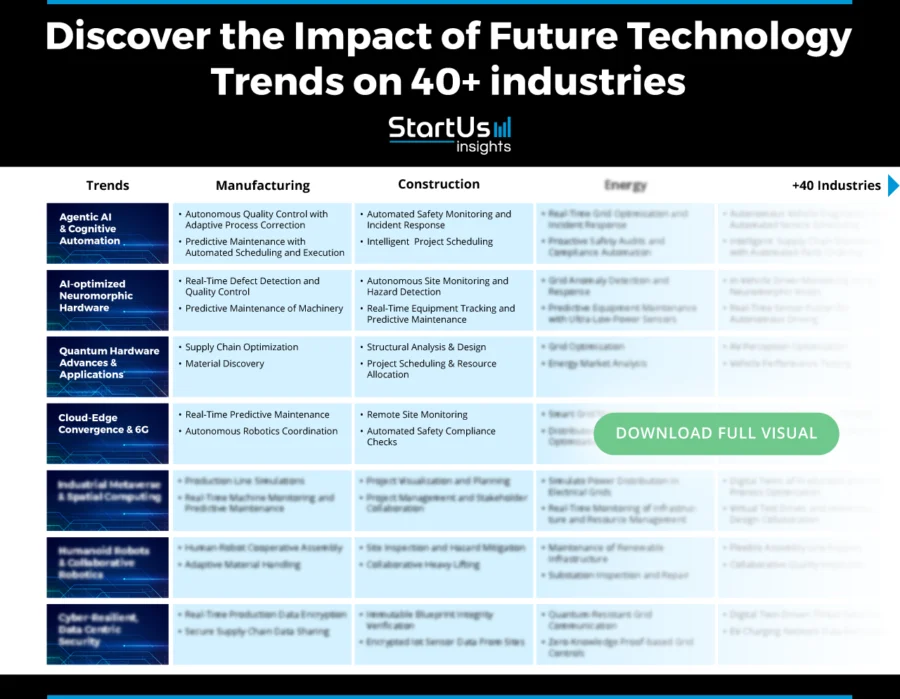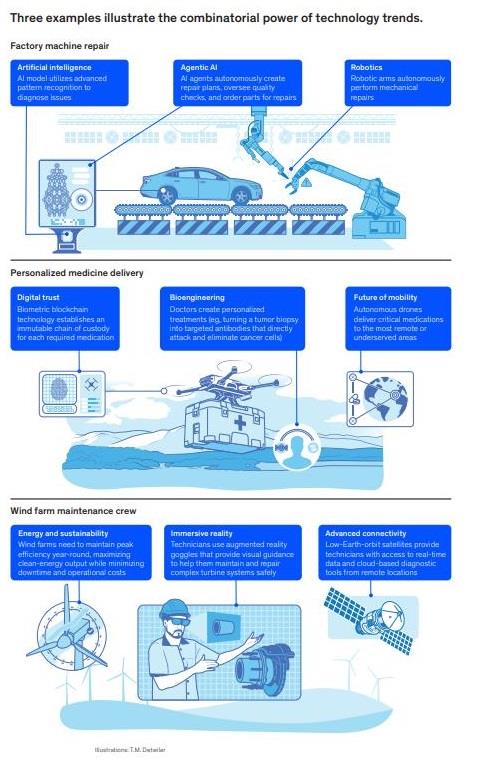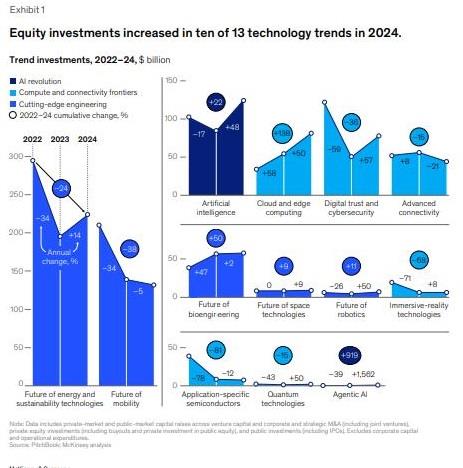“`html
UK Technology Trends 2025: An In-depth Analysis
Estimated reading time: 10 minutes
Key Takeaways
- The UK tech sector is a global powerhouse, valued at $1.2 trillion and exhibiting strong growth.
- Artificial Intelligence, particularly generative AI, is a dominant force driving innovation and revenue.
- Cybersecurity remains paramount, with an increasing focus on advanced threat detection and data protection.
- Emerging technologies like quantum computing and Web3 are gaining traction, promising future disruption.
- The future of UK technology hinges on navigating opportunities in innovation while addressing challenges like skills gaps and funding.
Table of contents
- The Evolving UK Tech Industry Outlook for 2025
- Key AI Trends Shaping the UK in 2025
- Navigating Cybersecurity Trends in the UK for 2025
- Emerging Technologies Poised for Growth in the UK in 2025
- The Future of UK Technology: Opportunities and Challenges
- Concluding Thoughts on UK Technology Trends 2025 Analysis
The Evolving UK Tech Industry Outlook for 2025
The UK technology sector is undergoing a period of remarkable dynamism, solidifying its position as a leading global tech hub. The **UK technology trends 2025 analysis** reveals a robust and expanding ecosystem. Currently, the UK tech industry is valued at an impressive $1.2 trillion, making it the most valuable tech ecosystem in Europe. This remarkable valuation underscores the sector’s resilience and its significant contribution to the national economy. The industry has demonstrated a strong compound annual growth rate (CAGR) of 12.5%, a testament to its innovative spirit and ability to adapt to evolving market demands.

Several factors contribute to this sustained growth and resilience. The UK boasts a diverse range of subsectors, including burgeoning areas like fintech and green technology. These specialized fields are not only at the forefront of innovation but also highly attractive to substantial investment, both domestic and international. The ability of these diverse segments to attract capital is crucial for fostering further development and scaling of innovative solutions. As we look towards 2025, the **future of UK technology** is being shaped by a complex interplay of economic and societal factors. Geopolitical shifts, evolving global trade dynamics, and an increasing emphasis on sustainability goals are all influencing the trajectory of the sector. Companies are increasingly prioritizing solutions that align with environmental, social, and governance (ESG) principles, driving demand for sustainable computing and eco-innovations.

The UK’s strength as a global tech hub is further evidenced by its forward-looking approach to various technological frontiers. The public sector, for instance, is increasingly adopting innovative technologies to improve services and efficiency. Simultaneously, advancements in areas like artificial intelligence are not just confined to the private sector but are also being explored for their potential to drive public good. The ongoing development of autonomous vehicles also highlights the UK’s commitment to cutting-edge innovation, with significant investments and research pouring into this transformative field.

In essence, the **UK tech industry outlook 2025** is overwhelmingly positive, characterized by significant growth, diversification, and a strong capacity for attracting investment. The nation’s commitment to fostering innovation across a broad spectrum of technological domains positions it for continued success on the global stage.
The discussion around the impact of AI on UK jobs is critical as the technology evolves.
Key AI Trends Shaping the UK in 2025
Artificial Intelligence (AI) continues to be a central pillar of technological advancement, and the **AI trends UK 2025** analysis points to its ever-increasing influence. AI is no longer a nascent technology; it is a proven driver of revenue growth across a multitude of sectors. Industries such as healthcare and finance are leveraging AI for enhanced diagnostic capabilities, sophisticated predictive analytics, and personalized customer service. These applications not only improve efficiency but also unlock new avenues for value creation and operational excellence.

A particularly exciting area of AI development is generative AI. This segment of AI is revolutionizing industries by enabling scalable, real-world applications that were previously unimaginable. The significant median growth-stage funding for generative AI companies, which has reached $40 million, highlights the immense investor confidence and the perceived potential of this technology. Generative AI is poised to transform content creation, software development, drug discovery, and much more, offering unprecedented creative and problem-solving capabilities.
However, the rapid advancement of AI also brings critical ethical considerations to the forefront. Issues such as algorithmic bias, data privacy concerns, and the potential for misuse necessitate careful attention. The development and implementation of a robust regulatory framework are essential to ensure that AI technologies are developed and deployed responsibly, ethically, and in a manner that benefits society as a whole. The UK government and regulatory bodies are actively engaged in shaping these guidelines to foster innovation while mitigating risks.

The **AI trends UK 2025** are characterized by both groundbreaking innovation and a growing awareness of the responsibilities that come with such powerful technology. As AI becomes more deeply integrated into the fabric of our society and economy, understanding these trends and their implications is crucial for businesses and policymakers alike. The future of many industries will undoubtedly be shaped by how effectively they can harness the power of AI while navigating its ethical complexities.
Stay informed about top AI trends and revolutionary AI innovations.
Explore how AI is changing the world and discover game-changing AI-powered workspaces.
Understanding UK AI regulations is key for compliance.
Navigating Cybersecurity Trends in the UK for 2025
In an increasingly interconnected digital world, cybersecurity is no longer just an IT concern; it’s a fundamental business imperative. The **cybersecurity trends UK 2025** landscape is marked by the escalating sophistication of cyber threats. Attackers are continuously refining their methods, making the threat landscape more dynamic and challenging to navigate than ever before. Organizations must remain vigilant and proactive in their defense strategies to protect their assets and sensitive data.

To counter these evolving threats, key defensive strategies and technologies are being widely adopted. Zero-trust architectures, which operate on the principle of “never trust, always verify,” are becoming a cornerstone of modern security frameworks. AI-enhanced security tools are also playing a crucial role, enabling faster detection of anomalies and more intelligent response to threats. Furthermore, advanced cloud security measures are essential as more businesses migrate their operations and data to cloud environments.

The importance of robust data protection measures cannot be overstated. With the increasing volume and sensitivity of data being handled, organizations must ensure strict adherence to privacy regulations. Compliance with frameworks like the General Data Protection Regulation (GDPR) is not only a legal requirement but also a critical factor in maintaining customer trust and safeguarding reputation. The consequences of data breaches extend beyond financial penalties, often resulting in significant reputational damage.

As we look towards 2025, the **cybersecurity trends UK 2025** will continue to evolve in response to new technologies and emerging threats. The integration of AI in both offense and defense is a key area to monitor. Cloud-native security solutions will become even more critical as organizations embrace hybrid and multi-cloud strategies. The human element remains a significant factor, with ongoing training and awareness programs being vital to mitigate risks associated with social engineering and insider threats.
Staying ahead of the curve in cybersecurity requires continuous adaptation and investment in the right tools and expertise. The UK government and industry bodies are actively working to enhance the nation’s cyber resilience, recognizing its importance for economic stability and national security.
Explore 2025 cybersecurity threats and learn tips to stay safe online.
Discover next-gen AI and cloud security and review Cloudflare’s threat reports.
Ensure your devices are secure with a secure smartphone guide for 2025.
Emerging Technologies Poised for Growth in the UK in 2025
Beyond the dominant forces of AI and cybersecurity, a fascinating array of **emerging tech UK 2025** is set to shape the technological landscape. Quantum computing, while still in its early stages of widespread adoption, holds immense potential to revolutionize computation. Its ability to solve complex problems currently intractable for classical computers could lead to breakthroughs in fields like drug discovery, materials science, and cryptography. While the timeline for broad commercialization remains uncertain, significant research and development are underway in the UK.

Web3 and blockchain technologies are continuing to gain traction, moving beyond cryptocurrencies to explore applications in secure data management and the development of decentralized applications (dApps). These technologies offer new paradigms for ownership, transparency, and user control over data, potentially reshaping how we interact online and manage digital assets.

Sustainable tech is another area experiencing considerable growth, driven by increasing global awareness of environmental challenges and a growing commitment to ESG priorities. This encompasses a wide range of innovations, from renewable energy solutions and energy-efficient computing to technologies that support circular economies and reduce waste. The UK is actively investing in and developing green technologies, aligning technological progress with environmental stewardship.

Advancements in connectivity, particularly with the rollout and development of 5G and the anticipated evolution towards 6G, are poised to transform data speeds and reduce latency. These enhanced communication networks are foundational for many emerging technologies, enabling real-time data processing and supporting the massive connectivity required for the Internet of Things (IoT) and advanced AI applications.

The **emerging tech UK 2025** landscape is characterized by a convergence of these powerful innovations. Quantum computing, Web3, and advanced connectivity will likely interact and amplify each other’s impact, creating new possibilities and challenges. The UK’s strategic focus on fostering research and development in these areas positions it to be a significant player in the next wave of technological transformation.
Explore key technology trends for 2025 and the Web3 revolution.
Discover quantum computing breakthroughs and sustainable computing innovations.
Learn about 5G connections and their rapid growth.
The Future of UK Technology: Opportunities and Challenges
Synthesizing the trends discussed reveals a compelling picture of the **future of UK technology**. The opportunities for innovation, investment, and job creation are immense, particularly in areas driven by AI and emerging technologies. The UK’s vibrant startup ecosystem, coupled with strong academic research institutions, provides fertile ground for new ideas to flourish and scale. Sectors poised for significant growth include AI-driven services, advanced cybersecurity solutions, and the application of quantum computing and Web3 technologies. The focus on sustainable technology also presents a substantial opportunity for the UK to lead in developing environmentally responsible solutions.
However, the path forward is not without its challenges. A significant hurdle is the persistent skills gap within the tech industry. The rapid pace of technological change means that the demand for specialized skills often outstrips the supply, creating a bottleneck for growth. Addressing this requires a concerted effort in education, retraining, and upskilling initiatives. Furthermore, ensuring accessible funding for startups and scaling businesses remains a critical factor in nurturing innovation.

The competitive landscape on an international level is also intense. The UK must continue to foster an environment that attracts global talent and investment, while also supporting its domestic tech champions. Navigating complex regulatory environments, both domestically and internationally, will be crucial for businesses operating in areas like AI and data privacy. The **UK tech industry outlook 2025** indicates strong potential, but overcoming these challenges will be key to realizing that full potential.

The dynamic nature of technology means that continuous adaptation and strategic foresight are essential. Businesses that can effectively leverage new technologies while proactively managing risks and investing in their workforce will be best positioned for success.
Explore critical AI challenges and the impact of AI regulation.
Understand the impact of AI on jobs and how AI is transforming businesses.
Learn about AI’s impact on digital transformation strategies.
Concluding Thoughts on UK Technology Trends 2025 Analysis
In summary, the **UK technology trends 2025** analysis highlights a sector defined by robust growth, significant innovation, and a dynamic outlook. Key themes have emerged, including the pervasive influence of AI, the critical importance of advanced cybersecurity, and the exciting potential of emerging technologies like quantum computing and Web3. The UK’s position as a global tech leader is well-established, driven by a combination of entrepreneurial spirit, strong R&D capabilities, and a supportive investment environment.

Staying informed and maintaining adaptability are paramount for navigating the rapidly evolving tech landscape. The pace of change is unrelenting, and organizations and individuals alike must embrace continuous learning and be prepared to pivot as new technologies and market dynamics emerge. The UK’s trajectory as a key player in global technological advancement appears strong, with a clear commitment to fostering innovation and embracing future-forward solutions.

The rapid integration of AI into various sectors, from healthcare to finance, presents unprecedented opportunities for efficiency and innovation. Simultaneously, the development of AI for societal benefit, such as AI solutions for climate change mitigation, underscores its potential to address some of the world’s most pressing challenges.
The UK is well-positioned to capitalize on these advancements, but success will depend on addressing key challenges such as the skills gap and ensuring equitable access to funding and resources. Embracing innovation requires a proactive approach. Readers are encouraged to engage actively with these trends—whether through further research, strategic planning, or by championing the adoption of new technologies within their own spheres of influence. The future of UK technology is being shaped now, and informed participation is key to realizing its full promise.
Stay updated on new AI regulations and explore AI-driven emerging tech innovations.
Consider the impact of AI-powered workspaces and the top AI trends to watch.
“`



